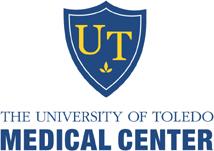THERE HAVE BEEN REMARKABLE ADVANCES in the treatment of HIV over the last three decades, with the disease going from an almost certain death sentence to a chronic condition that can be managed with medication.
However, the disproportionate burden the virus has placed on black Americans remains firmly in place. “HIV can affect anyone, but since the very early days of the epidemic, certain communities have been much more likely to be affected by HIV,” said Dr. Joan Duggan, an infectious disease specialist who treats HIV at The University of Toledo Medical Center. “In spite of all the scientific progress we’ve made, there’s still a huge racial disparity in infection rates. It’s a multifaceted problem and one we absolutely have to address.”
Despite making up less than 14% of the total U.S. population, black people accounted for 42% of the 35,000 new HIV diagnoses in 2020.
In observance of National Black HIV/AIDS Awareness Day, UTMC is hosting a community engagement breakfast on Thursday, February 9, to highlight those disparities and share information about local resources. Dr. Stella Safo, a nationally recognized HIV primary care physician and advocate for gender and racial equity in medicine, will be the keynote speaker.
The event will be held from 8:00 to 9:00 a.m. at the Glass City Center in downtown Toledo. Registration for the free public event is required and can be completed via the UTMC website (https://utmc.utoledo.edu/ webforms/black-hiv-awareness.html).
Safo, who earned both a medical degree and master of public health degree from Harvard, is an assistant professor of medicine at Mount Sinai and the founder of the advocacy group Just Equity for Health. “Dr. Safo brings a unique perspective and is a very valuable voice in this discussion,” Duggan said. “If we want to break this epidemic, we have to find everybody who is positive and get them treatment to break the chain of transmission. We need to do everything we can to connect with people and decrease the stigma and fears associated with HIV and HIV testing.”
Under proper medical care that reduces the amount of virus in their blood, HIV-positive individuals can enjoy a normal life expectancy and, importantly, cannot spread the virus to others.
In addition to testing and treatment, prevention is also key to slowing the spread of HIV. Pre-exposure prophylaxis, or PrEP, can nearly eliminate someone’s risk of contracting HIV through sex. But data from the U.S. Centers for Disease Control and Prevention show only 9% of black people who were eligible for PrEP were prescribed it, compared to 65% of white people.
Current data suggest one in two gay and bisexual black men will be diagnosed with HIV in their lifetime, versus one in 11 gay and bisexual white men.
“It’s well documented how many families are one health crisis away from financial ruin. We need to get the message out that we have programs that can help,” Duggan said. “There are so many things that can prevent people from making that first step—fear of big bills, difficulty accessing medical care, social stigma, fear and distrust of the medical system. We have the resources to help overcome those barriers.”
The Ryan White Program at UTMC offers high-quality comprehensive care for individuals and families affected by HIV/AIDS. The program offers adult primary care, mental health counseling, case management, advocacy, and HIV testing in Lucas County and the surrounding area.
UTMC offers nutritional and financial counseling and has additional funding resources, including the Ann Wayson Locher Memorial Fund for HIV Care, to help patients with emergency financial assistance, food assistance, transportation assistance, and other needs.
“UTMC provides excellent medical care and case management in an inclusive environment. We have a very big and robust mental health services arm and a plethora of supportive services to help people through hardship,” Duggan said. “We’re here to meet you where you’re at.”
Individuals can receive free, confidential HIV testing through UTMC at the Ruppert Health Center by calling 419-383-6057.
Tyrel Linkhorn is a communications specialist at The University of Toledo. ✲


